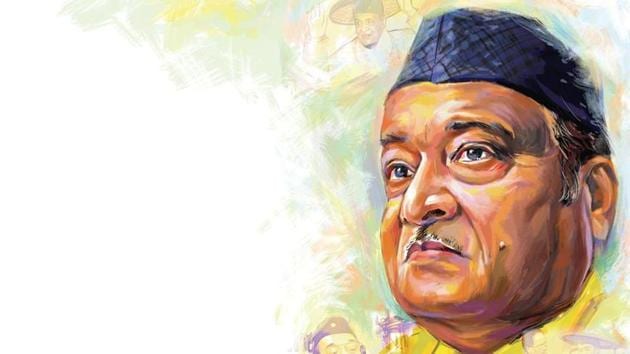Bhupen Hazarika: The Bard of Brahmaputra
Referred to as north-east India’s uncrowned king of musical world, he was among the most celebrated artists of 20th century. A poet, music composer, singer, actor, author and filmmaker, he interpreted Assam’s rich folk heritage through his songs beautifully. He was awarded the Bharat Ratna posthumously this year.
Born on September 8, 1926 to Nilakanta and Shantipriya Hazarika in Sadiya, Assam, Bhupen Hazarika was the eldest among his 10 siblings. He inherited his singing skills from his mother who sang lullabies to him and introduced him to the state’s folk music.

Early life and education
A child prodigy, Hazarika wrote his first song at 13. His talent was spotted by noted Assamese lyricist Jyotiprasad Agarwala and artist Bishnu Prasad Rabha.
After receiving his early education from high schools in Guwahati, Dhubri and Tezpur, Hazarika joined the Banaras Hindu University from where he received his BA degree in 1944 and MA degree in political science in 1946. Three years later, he joined the Columbia University, New York, and earned his doctoral degree in 1952.
Musical journey
In New York, Hazarika befriended Paul Robeson, a prominent civil rights activist, who influenced him to compose the famous song Bistirno Parore which is based on the imagery and theme of Robeson’s Ol’ Man River. This song, considered as one of his epical compositions, has been translated in various Indian languages. He was involved with the All Assam Conference of Indian People’s Theatre Association. He taught at the Gauhati University but left the job after a few years and shifted to Kolkata.
Later he became a film director and made award-winning Assamese films Shakuntala Sur (1961) and Pratidhwani (1964). Some of his directorial ventures include Lati-Ghati (1966), Chik Mik Bijuli (1969), For Whom the Sun Shines (1974) and Mera Dharam Meri Maa (1976). He also composed music for many Assamese and Bangla movies such as Aarop (1973), Chameli Memsaab (1975) and Shimana Perye (1977).
Legacy
Credited with introducing the culture and folk music of Assam and Northeast India in Hindi cinema at a national level, he composed and sang songs which are marked by themes of humanity and universal brotherhood. One of his major contributions to Hindi cinema was composing music for well-known films such as Arop, Ek Pal, and Rudaali. He won the Best Music Director National Award for Rudaali in 1993. He held the position of chairman at the Sangeet Natak Akademi from 1998 to 2003.
Personal life
While studying at Columbia University, Hazarika met Priyamvada Patel and they got married in 1950. He died in Mumbai on November 5, 2011 and was cremated near the Brahmaputra river in a plot of land donated by the Gauhati University. His funeral was attended by an estimated half a million people.
Awards & Recognitions
The recipient of Padma Shri (1977), Padma Bhushan (2001), and Padma Vibhushan (2016), Hazarika also received the Dadasaheb Phalke Award(1992). He received the National Award for Best Feature Film in Assamese (1961) and for Best Music Direction for Chameli Memsaab (1975).
He was a recipient of both the Sangeet Natak Akademi Award (1987) and the Akademi Fellowship (2008). He was honoured with Asom Ratna, Assam’s highest civilian award (2009). In both 2013 and 2016, he was honoured with commemorative postage stamps.
Interesting facts
1. The music legend also had a brush with politics. Between 1967 and 1972, Hazarika was an independent MLA. In the 2004 elections he unsuccessfully contested the Guwahati Lok Sabha seat on a BJP ticket.
2. India’s longest road bridge Dhola-Sadiya, built over river Lohit (Assam), is referred to as Bhupen Hazarika Setu. Guwahati’s Barsapara Cricket Stadium was renamed as Dr. Bhupen Hazarika Stadium (2010).
3. A docu-feature film on Hazarika’s life titled Moi Eti Zazabor (I am a wanderer), which was jointly directed by late Waesqurni Bora and Arnab Jan Deka has been under production since the year 1986.
4. His inclination towards singing developed because as a child he grew up listening to tribal music. According to him, he used one of his mother’s lullabies in the movie Rudaali (1993).
5. He produced a tele- serial (Dawn) for Star TV, and a 18-part documentary called Glimpses of the Misty East on the socio-economic and cultural progress in North-East India from 1947 to 1997.
Sources: Wikipedia, thefamouspeople.com



